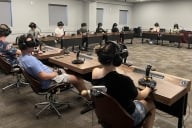You have /5 articles left.
Sign up for a free account or log in.

Seton Hill University
A recent report by the Faculty Senate of George Washington University showed that there is “no universitywide master list” of online programs at the institution -- nor any guidelines describing how new online courses should be approved and monitored.
The report recommended that all distance education programs at the Washington institution should be reviewed to “determine their appropriateness for online instruction.” The extent to which faculty members are involved in monitoring online degree programs is “unclear,” the report stated.
As described in “Inside Digital Learning,” the GWU report is an example of how faculty members aim to assert more control over an online effort that grew quickly, leaving many professors feeling out of the loop.
At Seton Hill University, near Pittsburgh, on the other hand, no group is left out of the process of developing, revising or evaluating online courses. A “strong” collaboration among faculty members, administrators, instructional designers, information technology staff and others exists to ensure quality and rigor, said Debra Faszer-McMahon, dean of the school of humanities and associate professor of Spanish.
“Part of our ethos is that … no matter the delivery format, we really want all degree programs to have high-quality teaching and learning standards,” she said.
In recent years, Seton Hill began broadening its online offerings to meet the needs of its growing population of adult learners. Faszer-McMahon admits that because Seton Hill is a private Roman Catholic university with 2,200 total residential and online students and 105 full-time professors, it’s likely more nimble than big universities in its efforts to ensure online course quality.
Susan Yochum, provost and a chemistry professor since 1985, claims, “Some larger institutions are resistant to change. Teaching is our mission.”
However, Seton Hill officials interviewed for this article said the institution’s model is not without challenges or need for improvement.
Willing Faculty Members
Seton Hill began offering online courses to residential students in the early 2000s. About 10 years ago, the university hired two instructional designers to support faculty members in developing and teaching distance education courses.
“We are fortunate that our faculty are willing to seek advice from instructional designers,” Yochum said. “We are all in the same game.”
In 2007, Seton Hill received a five-year federal Title III grant that enabled it to develop best practices for classroom and online technologies. The Title III program helps institutions expand their capacity to serve low-income students by providing funds to improve academic quality, among other things. The university offered intensive, voluntary online teacher training, and over time 80 percent of instructors participated, according to Faszer-McMahon.
Now every full- and part-time instructor is required to participate in the university’s formal virtual faculty academy before teaching online. The academy is an intensive three-week program housed in the institution’s learning management system. “It’s equivalent to a two- to three-credit course,” said Mary Spataro, director of Seton Hill’s Innovative Teaching and Learning Center.
The academy “provides some kind of baseline about what tools a faculty member takes to the workbench” in an online course, said John Spurlock, a professor of history and a former Faculty Senate president.
As faculty members became more comfortable teaching online, Seton Hill launched more courses in a variety of disciplines as well as a fully online master’s degree in special education. But as online offerings expanded, professors, administrators and others recognized that they needed to communicate more formally, “So we put a process in place so we would get feedback and make changes,” Faszer-McMahon said.
The Faculty Senate formed an academic technology committee, which includes a professor from each school, along with representatives from the registrar’s office, the library, disability services and IT. The university’s chief technology officer also is a member, and Spataro is chair. When a new online course is proposed, it must be reviewed and approved by the committee.
To boost its quality-assurance efforts, Seton Hill three years ago joined Quality Matters, a membership organization that promotes quality online education and student learning. “It was an already established guidance,” said Yochum. “They provide a lot of resources, and we didn’t have to reinvent the wheel.”
Once a course is approved by the committee, a subject-matter expert works with an instructional designer, who creates a template so that all online classes maintain the same quality and rigor.
“There are checks and balances prior to the courses beginning, and there is student feedback at the end of the courses,” Yochum said. Deans and program directors have access to student evaluations, and if they see something is not working, instructional designers are consulted. Then the instructors are brought into the loop.
Challenges, Too
Seton Hill’s collaborative efforts aren’t immune to challenges. For instance, professors with full course loads have to create online sections in a quick eight-week turnaround.
“To develop what we really want is an intense, interactive process,” Faszer-McMahon said. “It’s not going to be perfect the first time we roll it out, but we are committed to the ongoing assessment process … You are coming back and checking for quality.”
Also, as at many universities and colleges, a large number of Seton Hill’s online courses are taught by adjunct professors, a trend that will continue as the institution expands its online offerings to meet swelling demand. Seton Hill plans to launch three fully online undergraduate programs and a master’s of business administration.
“We have a high-quality adjunct work force,” Faszer-McMahon said. “But with the [limited] time they are on campus, they don’t have the same level of training or investment as the on-campus faculty.”
To better engage part-timers, the university has recruited some of them to serve as subject-matter experts to collaborate on online course design, she said.
While Seton Hill employs the Quality Matters rubric, Faszer-McMahon said the institution wants to create its own rubric specifically for online liberal arts courses, because the liberal arts are the backbone of the university’s curriculum.
“There are areas that we have room for growth,” she said. But, she added, all functions will be included as programs are rolled out and evaluated. “We want to make sure that we foster a culture of connectedness.”
Yochum agreed. “Sitting down and talking is part of our culture. It’s who we are.”








